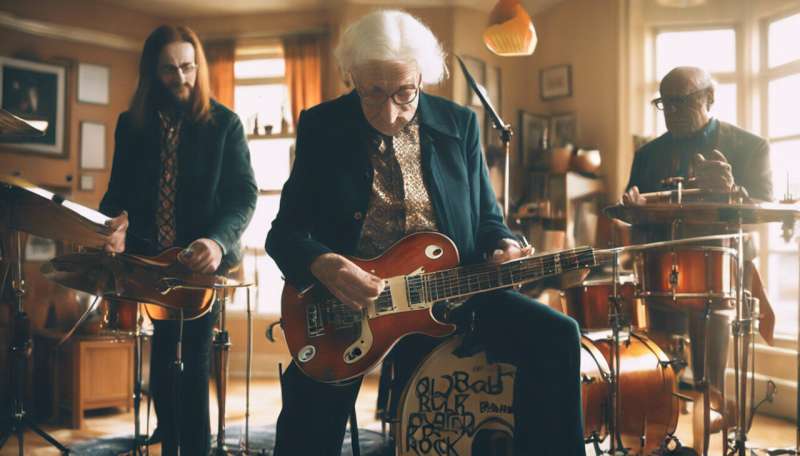This article has been reviewed according to Science X's editorial process and policies. Editors have highlighted the following attributes while ensuring the content's credibility:
fact-checked
proofread
Rock bands as transformative learning spaces for older adults

Everyone's right to learn continues throughout life. According to Finnish music education researchers, educational and cultural institutions are responsible for finding new ways to respond to the needs of a rapidly aging society.
Finland is one of the super-aging countries identified by the United Nations (UN), with around 21% of its population aged 65 or over. Other super-aging countries include, for example, Japan, Germany, and Italy. By 2030, even more countries that meet the definition will join in.
The growing number of older people will require societies not only to develop new services but also to extend and redesign existing services, such as education.
"We need to provide an increasing variety of leisure and educational opportunities for people beyond working age, as learning should continue throughout life. Educational and cultural institutions have a responsibility to respond to the needs of a rapidly aging society in increasingly diverse ways," argue Tuulikki Laes and Laura Kiuru, who have studied rock band activities organized by music educators for senior housing communities in Finland.
Adult rock band is an emerging phenomenon within Finland's innovative music education field and provides an alternative to traditional leisure activities for older adults. The music education project of the study is pedagogically goal-oriented, focusing on individual learning and emphasizing performances as collective learning experiences.
Music connects generations
For their study, Laes and Kiuru interviewed the rock band members and videotaped their performance situations. Most of the participants were beginner music learners aged 71-81.
In light of their video-stimulated interview data, the researchers examine these rock bands as a transformative learning space where older adults can reconstruct their identity as music learners and societal actors through musical practices and public performances.
The researchers also made an important notion of how music, in this case rock music, builds bridges between generations.
"At the gigs, people of all ages have come to listen to the older musicians with interest and joy. The participants told how they felt having the opportunity to show that you can do this when you are old," the researchers say.
'This, too, is a wonderful time of life'
Aging can naturally affect learning processes, for example, through visual or auditory decline, creating feelings of frustration when skills do not accumulate as quickly as before. Learning can feel like a struggle, with alternating experiences of failure and success.
These should not be ignored, according to the researchers, but through pedagogically sensitive guidance, learners can be supported to overcome obstacles. The meaningfulness of learning and self-determined learner identity is built through struggle.
This study has the potential to develop new solutions to support lifelong learning and empowerment in older age. For example, research has shown that purposeful learning contributes to life management, self-confidence, a sense of purpose in life, and social cohesion of aging individuals.
"When involved in music, I think this stage of life is wonderful too, and of course, being in a band contributes to that. You can always develop when you're involved in something new," confirms one rock band participant interviewed for the study.
The study (in Finnish) is published in the journal Aikuiskasvatus.
More information: Tuulikki Laes et al, Identiteettityöskentely aikuisbändissä, Aikuiskasvatus (2023). DOI: 10.33336/aik.127920
Provided by University of the Arts Helsinki




















